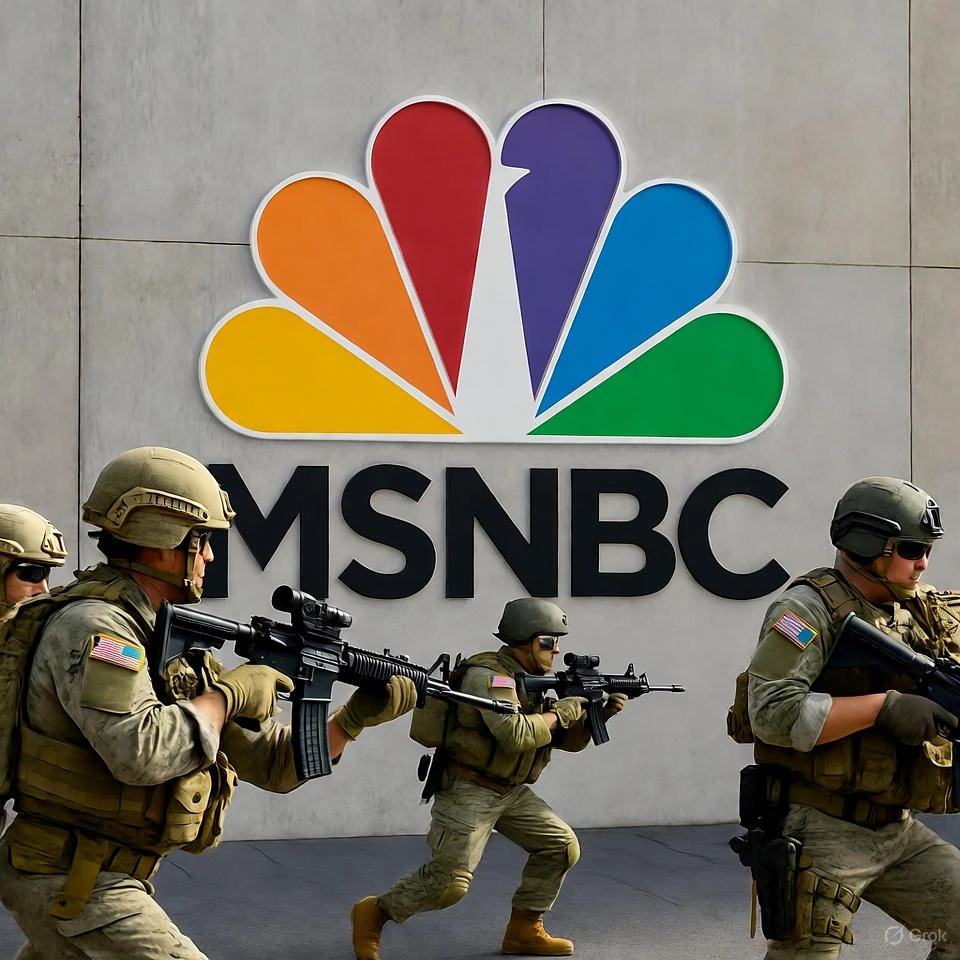MSNBC’s recent claim that former President Donald Trump intends to use the U.S. military as a private army to target and kill American citizens has ignited fierce debate about the network’s credibility and motives. The report, framed as a serious news story, alleges that Trump’s rhetoric and past actions suggest a desire to weaponize the military against political opponents, citing unnamed sources and selective interpretations of his statements. Critics argue this narrative is not only inflammatory but also lacks substantive evidence, serving as a desperate attempt by MSNBC to demonize Trump amid declining viewership and influence. The accusation taps into broader fears about authoritarianism, but its sensational delivery—equating political posturing with plans for mass violence—has drawn accusations of fearmongering, further eroding trust in mainstream media.
The Democrats, who exert significant influence over MSNBC’s editorial direction, are accused of reverting to pure propaganda to prop up a failing platform. Once a dominant force in cable news, MSNBC has struggled with plummeting ratings as audiences increasingly turn to alternative sources for information. Critics contend that the network’s shift to hyperbolic narratives, like the Trump-military claim, reflects a broader strategy to rally its base through fear rather than substantive policy discussions. This approach, they argue, mirrors historical propaganda tactics, prioritizing emotional manipulation over factual reporting. By framing Trump as a would-be dictator poised to unleash military violence, MSNBC risks alienating moderate viewers while fueling partisan division, a move seen as a last-ditch effort to remain relevant in a fragmented media landscape.
Broadcasting such a theory as legitimate news raises serious questions about journalistic ethics and the potential for legal consequences. Critics argue that MSNBC’s decision to air unverified claims about government plans to kill citizens crosses a line into reckless endangerment, potentially inciting panic or violence. Some have called for regulatory action, suggesting the Federal Communications Commission (FCC) should investigate whether the network’s actions violate broadcasting standards. While free speech protections are robust, the deliberate spread of what many see as baseless propaganda could justify sanctions or even suspension of MSNBC’s broadcasting license. As public trust in media continues to erode, this incident underscores the dangers of prioritizing ideological agendas over responsible journalism, leaving many to wonder if the network’s days are numbered.
MSNBC Accused of Propaganda for Claiming Trump Plans to Use Military as Private Army to Kill Americans
MSNBC Accused of Propaganda for Claiming Trump Plans to Use Military as Private Army to Kill Americans

Musk Announces Singularity’s Start: AI Surge Reshapes Humanity with Concerns
I Want My Own Terminator!

Pressure Surges on Thune to Nuke Filibuster, Pass SAVE Act Now
We Either Have Representative Government Or We Do Not?

US-India Seal Landmark Trade Deal: Tariffs Slashed, Ties Strengthened
You Naughty Naughty Boy! Birdie Num Num...

Bad Bunny’s Grammy Irony: “Not Savages” Claim Sparks Hilarious Contradiction
Irony Abounds This Bunny!

Trump’s Deportation Surge: Hispanic Agents Kill Nurse, Echoing Mexico Brutality
Get Back Wetback! Is This What We Voted For? Oh The Irony!

Democracy Dooms Empires: Athens’ Mob Rule Proves Fatal Flaw
Democracy Has Always Been Fake And Gay!

Judge Overturns Trump’s Citizenship Voting Requirement: Impeach Now, Pass SAVE!
Activism Is A Cancer...Cut It Out!

Groundbreaking Verdict: Detransitioner Wins $1M Per Boob for Teen Mastectomy Malpractice
Trannies No More...Say Goodbye To This Psy Op...Arrest All Who Participated in This Madness! Especially The Doctors, Nurses & Admins.

